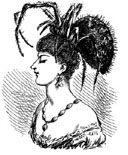
Discerning the Spirits of Deception
Fact, as the old cliché goes, is sometimes stranger than fiction. And at times, reality is more ridiculous than farce — especially when the Episcopal Church is involved.
Recently, while visiting Venezuela, Katharine Jefferts Schori, the presiding bishop and primate of the Episcopal Church, gave a homily in which she appeared to parody the mindset of “post-Christian” Christians. You know the type: those who claim the Christian identification but who are uncomfortable with overt Christian themes and teachings — even those found in the Bible — to which they prefer to give loosely rendered, airy-fairy, environmentalist-cum-feminist interpretations. But, as we’ve come to learn, the Katharine Jefferts Schori Show is no comedy act.
Preaching on St. Paul’s mission to Delphi (Acts 16) — okay, preaching probably isn’t the appropriate term here, so let’s say sharing — at All Saints Church in Curaçao on May 13, Jefferts Schori instructed the gathered crowd on the importance of embracing diversity: “Some people never do learn to value the different kinds of loveliness in the world around us,” she said. “Human beings have a long history of discounting and devaluing difference, finding it offensive or even evil. That kind of blindness is what leads to oppression, slavery, and often, war…. It’s a tendency that seems to emerge along a common timeline.”
Airy-fairy indeed. But let’s admit it: We’ve all been tempted, at one time or another, to paint history with a broad brush. Most of us, however, don’t have the benefit of doing so from a leadership position. Is Jefferts Schori saying, for example, that had the Nazis learned to value the loveliness of Jews, or the Soviets of the kulaks, that the slavery and oppression of forced-labor and concentration camps could have been avoided? If we understand her correctly, she’s intimating that the fundamental problem wasn’t their twisted ideologies but their perspective, their blindness. Hey, perhaps if the Allies hadn’t discounted the difference of the Axis powers, finding them offensive or even evil, we could have avoided World War II altogether. If only the world had been blessed back then by the deep thoughts of a bishop like her, what a better place it would be!
You May Also Enjoy
Through His Church, His covenant, His liturgy, His sacraments, His Word, and His Spirit, Christ continues to dwell among us.
Those who spin theories opposing John’s authorship are doing a great injustice to truth and the cause of Christ.
Jesus' empty tomb and repeated appearances eventually convinced the at first incredulous disciples and sent them forth to boldly proclaim the Gospel.

